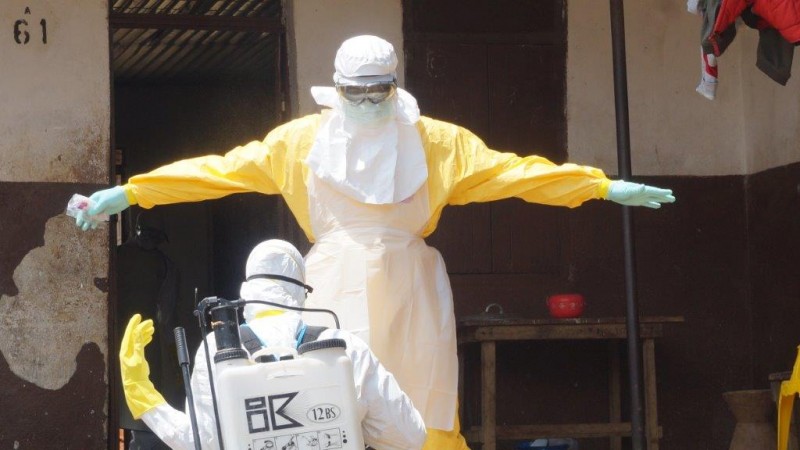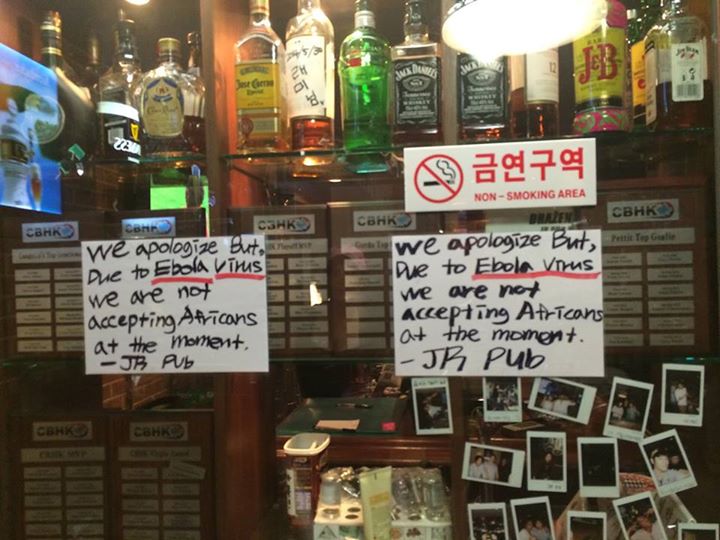
As one of the Ebola epicentres, the district of Kailahun, in eastern Sierra Leone bordering Guinea, was put under quarantine at the beginning of August. Photo credit: EC/ECHO/Cyprien Fabre. CC BY-ND 2.0
What is being described as the world's worst outbreak of Ebola is bringing out the worst in some people in the affected countries and around the world.
Ignorance of how the disease is spread means survivors of the disease are facing stigma at home, while people of African origin have faced discrimination abroad. As neighboring countries of those affected by the outbreak close their borders, workers are suffering the economic consequences. Without a confirmed medial cure for Ebola, con men are hawking their supposed cures to desperate people.
Since late June, the number of cases of Ebola reported throughout West Africa has more than quadrupled, from 567 to 2,615, according to the latest figures from the World Health Organization. A little over half of those who have contracted the disease, 1,427 people, have died.
Blogger Boubacar Sanso BARRY on the French-language website Guinée Conakry Info described the approach adopted by each of the governments of the countries concerned in an effort to contain the spread:
Face à la nouvelle flambée à virus Ebola qui sévit en Afrique de l’ouest, les différents pays adoptent des approches plutôt différentes. Si en Guinée, en dépit des dernières statistiques alarmantes, les autorités demeurent dans la logique de la relativisation de la maladie, par contre au Libéria et en Sierra Léone, l’armée et les forces de sécurité sont littéralement réquisitionnées pour faire face à l’ennemi. Dans le premier cas, on peut parler de sous-évaluation du problème, alors que dans le second, on a tout de même l’impression que les autorités libériennes et léonaises usent d’approches disproportionnées qui, en plus, décuplent la panique générale.
In response to the new outbreak of the Ebola virus in West Africa, the various countries are taking rather different approaches. In Guinea, despite the latest alarming statistics, the authorities are continuing to try to keep the disease in perspective, whereas in Liberia and Sierra Leone, the army and security forces have literally been requisitioned to face the enemy. In the first case, it can be said that the problem is being underestimated, yet in the second, it seems as if the the measures taken by the authorities in Liberia and Sierra Leone are out of proportion, and adding to the general sense of panic.
But ignorance of the disease is still widespread. Local Guinean NGO Community Centre for Educational Development (Centre communautaire pour le développement de l’éducation or CECODE, in French) conducted an opinion survey in a district of Conakry, Guinea, which has recorded more than 600 cases of Ebola, to assess the population’s knowledge of the disease. In reply to “question 1: What does the Ebola epidemic mean to you?”:
Plus de 72% des personnes interviewées trouvent la maladie « dangereuse, contagieuse, grave et mortelle ». Par contre, pour 24% des enquêtés, l’épidémie Ebola ne représente rien ; et 4% des personnes interviewées restent perplexes.
On relève dans les propos ce qui suit :
- « L’épidémie Ebola n’existe pas. Je ne crois pas à ce que les gens disent ».
- « Cette maladie ne représente rien pour moi parce que je ne comprends rien »
- « Je ne suis pas sûr de l’existence de la maladie ».
- « J’ai des inquiétudes d’aller à l’hôpital, j’ai peur »
- « Cette maladie est créée par les USA, les blancs ».
- « Je ne comprends rien de cette maladie ».
- « C’est un châtiment de Dieu ».
- « L’inquiétude ».
- « C’est pour protéger les intérêts du gouvernement »
- « Je vois à la télé des gens masqués soi-disant pour soigner la population ».
- « Je ne veux pas en parler ».
- « C’est un grand qui m’a dit que cette maladie ne vient pas de la forêt sinon nous allons tous périr »
- « Sanction divine ».
More than 72% of the people interviewed consider the disease to be “dangerous, contagious, serious and deadly”. However, 24% of those surveyed say that the Ebola epidemic means nothing to them, while 4% of the people interviewed remain confused.
The following comments were noted:
- “The Ebola epidemic does not exist. I don’t believe what people are saying”.
- “This disease means nothing to me, because I don’t understand anything about it”.
- “I am not sure if the disease exists”.
- “I am anxious about going to hospital, I’m scared”.
- “This disease has been created by the USA, by whites”.
- “I don’t understand anything about this disease”.
- “It is a punishment from God”.
- “A cause for concern”.
- “It’s to protect the interests of the government”.
- “I've seen people on tv wearing masks, to care for the population, or so they say”.
- “I don’t want to talk about it”.
- “A grown-up told me this disease does not come from the forest – if it does, we will all die”.
- “A divine punishment”.
On Aug. 17, In Liberia, the country that has been most severely affected, a group of men armed with knives and clubs, shouting ‘”there is no Ebola” in the country, attacked a quarantine centre set up in a school in West Point, a suburb of Monrovia, causing the patients to flee. It wasn’t until Aug. 20 that 17 of the patients who fled were found and transferred to the newly established Ebola treatment centre in the capital's John F. Kennedy Hospital.
At an international level, citizens of these countries are being subjected to an increasingly strict quarantine, with borders being closed, and most airlines suspending flights to the affected countries. Diplomats’ families in these countries are being repatriated, international conferences have been cancelled, and sporting events relocated.
However, an article published on the Resistance Authentique, a French blog curating trending topics, reflected on the opinion of many experts:
Il faut un contact direct avec un liquide biologique comme le sang, les selles, les vomissures. Il n’y a aucune transmission par voie aérienne C’est-à-dire que, lorsqu’une personne parle ou tousse, elle ne répand pas le virus Ebola dans l’air ambiant.
The virus is transmitted by direct contact with bodily fluid, such as blood, faeces or vomit. There is no airborne transmission. In other words (unlike what can be read elsewhere) the Ebola virus is not spread through the air by a person speaking or coughing.
Far away from the infected area, fear has led people to resort to measures with barely concealed ulterior motives. In South Korea, for instance, a pub displayed the sign shown on this photo reported by Twitter and published on MediaEqualizer, a US media-watch website. Around 800 comments by readers responding to it offered a glimpse of the negative view that many Koreans have of Africans.

“We apologize but, due to Ebola virus we are not accepting Africans at the moment.” The notice was displayed at the entrance of JR Pub in Séoul. Source: Harriet on Facebook with permission
A reader called Raptor wrote a comment on Instinct de Survie (Survival instinct) forum, a platform for proponents of open software, giving context for the outbreak:
L'éternel exemple que je sors à chaque fois: La grippe saisonnière fait entre 1500 et 2000 morts annuellement sur notre territoire. Loin de moi l'idée de vouloir tout comparer, mais je tente de relativiser tout ça. Dans la même veine, lors du séisme en Haïti nous avons pu constater des résurgences de peste, choléra, tuberculose… Pour autant, les conséquences à l'international n'ont pas été très visibles…
Avec près de 700 morts, nous sommes encore loin des références en la matière qui ont pu nous toucher par le passé (peste noire, grippe espagnole notamment).
Tenant compte de ça, quand je vois des occurrences comme “totalement hors de contrôle”, “épidémie sans précédent” dans les articles, je me demande si les médias n'auraient pas tendance à faire du journalisme à sensations plutôt que de la vraie info. Certains flux migratoires ramènent régulièrement des trucs qu'on ne trouvait plus sous nos latitudes, pour autant nous n'enregistrons pas de crises sanitaires.
The example that I always use is this: Seasonal flu causes between 1,500 and 2,000 deaths each year in our country. I don't want to make comparisons, but I’m trying to put things into perspective. Similarly, during the earthquake in Haiti, we saw outbreaks of plague, cholera and tuberculosis. However, the international impact was not very noticeable.
With almost 700 deaths (at the time of the post), we are still a long way from matching the scale of some of the diseases that affected us in the past (the black plague, Spanish flu, among others).
For that reason, when I see articles using phrases such as “totally out of control” or “unprecedented epidemic”, it makes me wonder if the media are resorting to sensationalist journalism instead of real information. The influx of migrants regularly introduces stuff that hasn't been seen before in our part of the world, and yet we are not constantly reporting health crises.
When neighbouring countries close borders, or even just introduce stricter entry requirements, it poses serious economic problems, especially for cross-border trade. The Guinean news website Actu224 posted the comments of a union official for lorry drivers on the Guinea-Malian border:
Beaucoup de Maliennes ont aujourd’hui abandonné l’axe Bamako -Conakry à cause des méfiances et des incertitudes autour de cette maladie. Voyez-vous, la gare est remplie de véhicules vides. Les rares qui arrivent à quitter de la journée ont tout le mal à faire le plein de clients …
Malheureusement, avec la pandémie d’Ébola, les Maliens sont de plus en plus réticents à aller à l’intérieur de la Guinée, mais les populations guinéennes continuent de fréquenter les foires hebdomadaires maliennes.
Many Malians have now abandoned the Bamako-Conakry highway because of the suspicions and uncertainties surrounding this disease. As you see, the station is full of empty vehicles. The few who manage to get away in the course of the day are struggling to find enough customers.
Unfortunately, with the Ebola pandemic, Malians are becoming more and more reluctant to go into the interior of Guinea, yet Guinean people are still attending the weekly fairs in Mali.
While international efforts are sending the affected countries all kinds of aid, including medical equipment, money, and vaccines that are not yet commercially available, religious leaders have been organising prayers to raise public awareness and help people gain a better understanding of what the health workers are doing.
The highly controversial Nigerian preacher and millionaire, TB Joshua, for his part, claims that a holy water that he has developed could cure patients suffering from the Ebola virus. He has sent 4,000 bottles of his water on his own private jet to help Sierra Leone.
Follow our in-depth coverage: The Struggle to #StopEbola in West Africa







2 comments